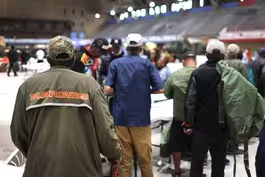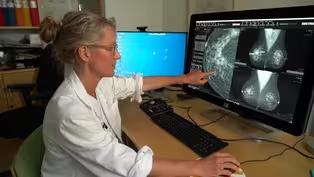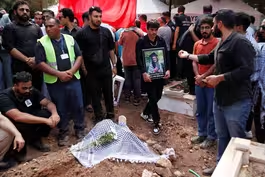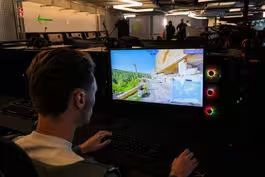
Gazan parents remain separated from their babies by war
Clip: 9/14/2024 | 3m 32sVideo has Closed Captions
Palestinian babies born outside of Gaza remain separated from their parents by war
A group of parents in Gaza have described heartbreak as they remain separated from their babies who were born prematurely in Jerusalem just over a year ago. They needed specialized care in Israel, and were supposed to be reunited with their parents, but the war has kept them separated. Rachel Younger of Independent Television News reports.
Problems playing video? | Closed Captioning Feedback
Problems playing video? | Closed Captioning Feedback
Major corporate funding for the PBS News Hour is provided by BDO, BNSF, Consumer Cellular, American Cruise Lines, and Raymond James. Funding for the PBS NewsHour Weekend is provided by...

Gazan parents remain separated from their babies by war
Clip: 9/14/2024 | 3m 32sVideo has Closed Captions
A group of parents in Gaza have described heartbreak as they remain separated from their babies who were born prematurely in Jerusalem just over a year ago. They needed specialized care in Israel, and were supposed to be reunited with their parents, but the war has kept them separated. Rachel Younger of Independent Television News reports.
Problems playing video? | Closed Captioning Feedback
How to Watch PBS News Hour
PBS News Hour is available to stream on pbs.org and the free PBS App, available on iPhone, Apple TV, Android TV, Android smartphones, Amazon Fire TV, Amazon Fire Tablet, Roku, Samsung Smart TV, and Vizio.
Providing Support for PBS.org
Learn Moreabout PBS online sponsorshipLISA DESJARDINS: A group of parents in Gaza have described heartbreak as they remain separated from their babies who were born prematurely in Jerusalem just over a year ago.
They needed specialized care in Israel, and their parents were supposed to reunite with them, but the war has kept them separated, meaning shaky video calls and the closest contact they have with the children are from those calls.
Rachel Younger of Independent Television News has this report from Jerusalem.
RACHEL YOUNGER (voice-over): Meet triplets, Najwa, Nur and Neshmay, a handful of mischief at almost 13 months old, and little Sethida (ph), who was born just a few weeks before them, it should be their parents here playing with them, but almost unbelievably, having been born just outside Gaza, they're now stuck on different sides of the impenetrable wall that surrounds it.
The only time they get to see their faces are during the fleeting minutes when they can get a connection to one of the most dangerous places on Earth.
Bubba or daddy, they shout as little Neishmate (ph) reaches out for the father she's never met.
The hospital can't get hold of Sahidas' (ph) parents today.
Back in Gaza, Hiba (ph) and Salah (ph) have been displaced to a tent and with no phone service, often, old photos are the only connection they have to their daughter.
I'm not sure that she recognizes me on the phone, she says, but the nurses tell me she does.
I hope she'll remember my face so when we finally meet, she won't feel like I'm a stranger.
Like the triplets parents, she'd already waited so long for a daughter, they're all IVF babies born here prematurely at the end of last summer, because even then, the level of neonatal care here wasn't available in Gaza.
DR. AMIR ATAWNEH, Makassed Hospital: They come.
They get their babies delivered here.
Then they can stay for few days or a week or so, and then they have to go home because the permits usually are have limited periods.
RACHEL YOUNGER (voice-over): They were due to come back for their babies on the eighth of October, but the war means that every day they are missing irreversible milestones, nor starting to crawl.
Neshma (ph) learning the drums, Saida (ph) attempting to blow her first kisses.
AMIR ATAWNEH: You know each one of us, it would be very interesting moment in his life when he sees his child just taking his first steps and walking around and talking and saying a Bama, such like that.
And the family, they missed those moments.
RACHEL YOUNGER (voice-over): All staff here can do is keep building the bond between baby and parent.
RACHEL YOUNGER: What happens when she sees -- WOMAN: When see the telephone?
Always say mama.
RACHEL YOUNGER (voice-over): Across the corridor, other luckier parents watch every moment of their newborns progress because Sahida (ph) and the triplets were equally tiny their mums in the little time they had never even got the chance to hold them.
LISA DESJARDINS: That was Rachel younger of Independent Television News.
A housing program reduced veteran homelessness. What’s next?
Video has Closed Captions
Clip: 9/14/2024 | 7m 9s | A federal housing program reduced veteran homelessness by more than half. What’s next? (7m 9s)
How a new FDA rule could help identify more breast cancer
Video has Closed Captions
Clip: 9/14/2024 | 5m 53s | How a new FDA requirement could help identify more breast cancer cases (5m 53s)
News Wrap: Hometown funeral held for slain Turkish-American
Video has Closed Captions
Clip: 9/14/2024 | 3m 35s | News Wrap: Turkish-American woman killed in West Bank buried in her hometown (3m 35s)
Star player Trevor Rainbolt’s tips for GeoGuessr success
Video has Closed Captions
Clip: 9/14/2024 | 3m 43s | GeoGuessr star player Trevor Rainbolt’s tips for success in the popular geography game (3m 43s)
Providing Support for PBS.org
Learn Moreabout PBS online sponsorship
- News and Public Affairs

FRONTLINE is investigative journalism that questions, explains and changes our world.

- News and Public Affairs

Amanpour and Company features conversations with leaders and decision makers.












Support for PBS provided by:
Major corporate funding for the PBS News Hour is provided by BDO, BNSF, Consumer Cellular, American Cruise Lines, and Raymond James. Funding for the PBS NewsHour Weekend is provided by...



